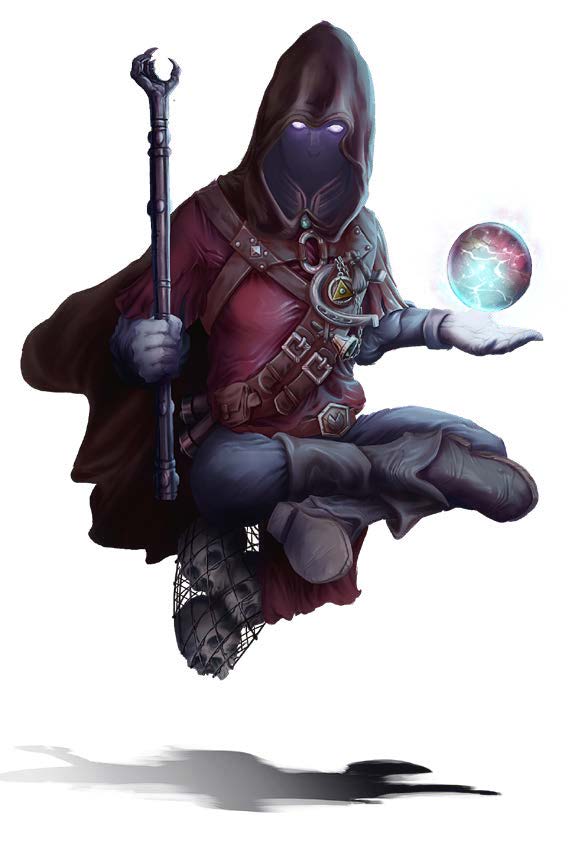 Supernatural boons might take the form of blessings or charms, providing worthy characters with some small benefit—the equivalents of wondrous items and potions. Such gifts are great fodder for quests and provide a venue both to make a character feel special and to circumvent attunement limits in a minor way. Supernatural gifts make the magic of a world feel more real with a quantifiable and concrete approach.
Supernatural boons might take the form of blessings or charms, providing worthy characters with some small benefit—the equivalents of wondrous items and potions. Such gifts are great fodder for quests and provide a venue both to make a character feel special and to circumvent attunement limits in a minor way. Supernatural gifts make the magic of a world feel more real with a quantifiable and concrete approach.
Stories and legends, however, are filled with magic not quite so benign. Whether the hexes of a hag, the wrath of a titan, or the decree of a vengeful devil, minor maladies that plague or hinder characters can provide a source of tension and even a comedic foil.
Presented below are some such malign alternatives to those gifts. Some operate like cursed magic items, and some operate like spell effects. Use them to harangue, harass, and humble your heroes!
Blights
Blights are sinister magicks that have long-term negative effects on a character. A character might be subjected to a blight after defiling a profane temple, crossing a powerful fey or fiend, or turning against a baleful patron. Simply defeating an evil creature or minion is unlikely to garner a blight, but single-handedly thwarting the long-term plans of a demon, causing a massive setback to a lich’s plan to unleash hordes of undead upon the kingdom, or bringing restoration to a long-cursed land may well result in one.
Example blights are listed below. The text of a blight addresses its user. A remove curse spell cannot remove a blight, and detect magic will not reveal the presence of a blight. Unless otherwise indicated, the DC is 16 to cancel a blight using dispel magic or a similar effect.
Blight of Ailment. One of your ability scores decreases by 2 to a minimum of 6.
Blight of Infestation. Your body is covered with tiny biting creatures that cause you to itch constantly. While taking a long or short rest, you must succeed on a DC 10 Constitution or Wisdom saving throw or gain no benefit from that rest.
Blight of Mind Broaching. You have disadvantage against magic that allows other creatures to read your thoughts, determine whether you are lying, know your alignment, or know your creature type. You cannot prevent creatures from communicating with you telepathically if they have that ability.
Blight of Respiration. You have disadvantage on saving throws made against harmful gases and vapors (such as cloudkill and stinking cloud effects, inhaled poisons, and the breath weapons of some dragons).
Blight of Vengeance. You must succeed on a DC 15 Wisdom saving throw whenever you take damage in combat. On a failed save, you must attack the creature that damaged you until you drop to 0 hp or it does or until you can’t reach the creature to make a melee attack against it.
Blight of Vulnerability. You suffer a –1 penalty to AC and saving throws.
Blight of Winter’s Chill. You have vulnerability to cold damage.
Blight of Wound Aggravation. You have disadvantage on death saving throws. In addition, whenever you roll Hit Dice to regain hit points, subtract 1 from the number of hit points it restores (each die still restores a minimum of 1 hit point).
Banes
Banes are minor, inconvenient effects less drastic than blights. A jealous noble might inflict a bane upon a character in retaliation for the character assisting the noble’s relative, or a hostile hedge magician might visit a blight upon characters to dissuade them from solving a local murder in which the magician was involved. Banes also work as minor curses; something a warlock might contract after foolishly poring through a tome of forbidden knowledge or a rogue might attract after daring to prize a precious gemstone from the eye socket of an evil god’s effigy. Though not powerful, a bane triggered at the right (or wrong!) time can have a major impact.
A bane can’t be removed from a creature by anything short of divine intervention or a wish spell.
Bane of Bewilderment. This bane triggers when you attempt to identify a magical item during a short rest. You are unable to identify items in this manner for 24 hours.
Bane of Gibberish. This bane triggers when you attempt to speak in an important situation. For 1 hour, your spoken and written words are unintelligible.
Bane of Hobbles. This bane triggers when you attempt to jump. For the next hour, divide your Strength score in half when calculating how far or how high you can jump.
Bane of Leaden Tongue. This bane triggers when you attempt to convince a creature of something. For 1 hour, you have disadvantage on Charisma checks and Wisdom (Insight) checks.
Bane of Putrescence. This bane triggers when you attempt to have a meal or consume food. All nonmagical food and drink within a 15-foot-radius sphere centered on you spoils. Any creature eating or drinking this food must succeed on a DC 15 Constitution saving throw or be infected with sewer plague.
Bane of Tortuous Pace. This bane triggers when you attempt to use the Dash action. For 1 hour, you cannot use the Dash action.
___
Magic is the lifeblood of fantasy. Arguably the dividing line between fantasy and other types of fiction, magic can be strange, mysterious, frightening, comical, or anything in between. And if you’re looking to explore the applications of magic in a fantasy roleplaying campaign, you want to visit the Sorcery Stop!
